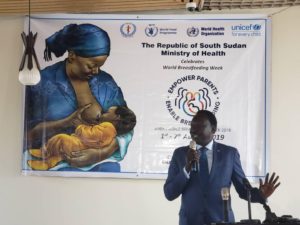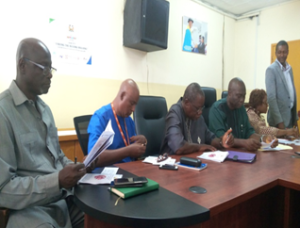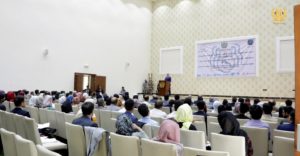World Breastfeeding Week 2019 in SUN countries
World Breastfeeding Week (#WBW2019) is celebrated every year from 1 to 7 August to encourage breastfeeding and improve the health of babies around the world. It commemorates the Innocenti Declaration signed in August 1990 by government policymakers, WHO, UNICEF and other organizations to protect, promote and support breastfeeding. …
 World Breastfeeding Week (#WBW2019) is celebrated every year from 1 to 7 August to encourage breastfeeding and improve the health of babies around the world. It commemorates the Innocenti Declaration signed in August 1990 by government policymakers, WHO, UNICEF and other organizations to protect, promote and support breastfeeding.
World Breastfeeding Week (#WBW2019) is celebrated every year from 1 to 7 August to encourage breastfeeding and improve the health of babies around the world. It commemorates the Innocenti Declaration signed in August 1990 by government policymakers, WHO, UNICEF and other organizations to protect, promote and support breastfeeding.
This year, WHO is working with UNICEF and partners to promote the importance of family-friendly policies to enable breastfeeding and help parents nurture and bond with their children in early life, when it matters most. This includes enacting paid maternity leave for a minimum of 18 weeks, and paid paternity leave to encourage shared responsibility of caring for their children on an equal basis. Mothers also need access to a parent friendly workplace to protect and support their ability to continue breastfeeding upon return to work by having access to breastfeeding breaks; a safe, private, and hygienic space for expressing and storing breastmilk; and affordable childcare.
SUN member countries celebrate this week with different events and also take the opportunity to present new tools and policies to promote exclusive breastfeeding in their countries. A summary of some of these activities that took place during the last World Breastfeeding Week in the SUN countries.
South Sudan
 South Sudan celebrated the launch of the World Breastfeeding Week 2019 with pomp and color starting with a match between Juba Teaching Hospital and Palm Africa Hotel organized by the SUN Movement Civil Society. The increase in exclusive breastfeeding in South Sudan following the development of UN-backed infant nutrition guidelines by the Ministry of Health UNICEF.
South Sudan celebrated the launch of the World Breastfeeding Week 2019 with pomp and color starting with a match between Juba Teaching Hospital and Palm Africa Hotel organized by the SUN Movement Civil Society. The increase in exclusive breastfeeding in South Sudan following the development of UN-backed infant nutrition guidelines by the Ministry of Health UNICEF.
UNICEF attributed the rise to the development of the maternal infant and young child nutrition guidelines by the Ministry of Health and the training of healthcare providers on appropriate infants and young children feeding practices.
Riek Gai Kok, minister of health in South Sudan said the government is committed to achieving 98 percent exclusive breastfeeding in the next five years with support from health and nutrition partners.
🇸🇸 South Sudan celebrated the launch of the #WBW2019 with pomp and colour, starting w/ a match from Juba Teaching Hospital to Palm Africa Hotel organized by the SUNCS 🇸🇸 🤱🏾 #WBW2019 #EmpowerParentsEnableBreastfeeding #worldbreastfeedingweek2019 👶🏾 @GerdaVerburg pic.twitter.com/zEpHe5boPw
— Scaling Up Nutrition ☀️ (@SUN_Movement) August 6, 2019
Tanzania
In the margins of the celebrations of the World Breastfeeding Week 2019 Tanzania´s government announced its plan to establish a breast milk bank. Minister for Health, Community Development, Gender, Elderly and Children Ummy Mwalimu said they were working on the best modalities for establishing the bank, which would, among other tasks, address nutrition issues amongst infants.
She said there were a number of challenges being discussed as far as the plan was concerned, including how best to get quality breast milk.
Cambodia
 At the World Breastfeeding Week Celebration event held in the province’s Siem Reap Chhiv Socheata, a first-time mother from Phnom Penh, shared her own experience of breastfeeding her one-year-old son. Inn her speech, the 28-year-old said that she chose to breastfeed her son exclusively for the first six months without any hesitation. She added that breastfeeding has kept her son healthier, noting that while babies in her neighbourhood were getting sick, her son remained in good health. Ms Socheata said she went on maternity leave for three months after giving birth, which allowed her to take care of her newborn full-time, along with the help of her family: “It was easy for me to feed my son during the first three months after his birth because I was at home and was supported by my husband and also my relatives,” she said.
At the World Breastfeeding Week Celebration event held in the province’s Siem Reap Chhiv Socheata, a first-time mother from Phnom Penh, shared her own experience of breastfeeding her one-year-old son. Inn her speech, the 28-year-old said that she chose to breastfeed her son exclusively for the first six months without any hesitation. She added that breastfeeding has kept her son healthier, noting that while babies in her neighbourhood were getting sick, her son remained in good health. Ms Socheata said she went on maternity leave for three months after giving birth, which allowed her to take care of her newborn full-time, along with the help of her family: “It was easy for me to feed my son during the first three months after his birth because I was at home and was supported by my husband and also my relatives,” she said.
At the event Gwyneth Cotes, Helen Keller International Cambodia country director, explained at the event that breastfeeding practices would prevent more than 800,000 child deaths worldwide every year. She added that breastfeeding also prevents breast cancer in women and contributes to better growth and development, among other benefits. “To be able to successfully breastfeed, mothers need support and encouragement from their families, friends, and communities,” Ms Cotes said.
In #Cambodia, the #WBW2019 is celebrated throughout the whole month of August. GIZ #MUSEFO & @acfusa work together with the MoH to improve women’s access to health services, increase awareness of inequalities & engage men. Together, we can empower parents & enable #breastfeeding! pic.twitter.com/PNWZrHU3yR
— Secure Nutrition (@SecureNutrition) August 30, 2019
Sierra Leone
 The United Nations Network (UN Network) for Scaling Up Nutrition (SUN) in Sierra Leone has congratulated the government through the Ministry of Health and Sanitation and its partners for the tremendous efforts taken to influence and increase breastfeeding rates across Sierra Leone. Recent data reveals that proposition of exclusive breastfeeding rate has improved, up to 62 per cent. The UN Network noted that this is a tremendous achievement that will contribute to the development of the children in the country. The Ministry of Health and Sanitation has kick-started a week long exclusive breastfeeding campaign in commemoration of World Breastfeeding Week.
The United Nations Network (UN Network) for Scaling Up Nutrition (SUN) in Sierra Leone has congratulated the government through the Ministry of Health and Sanitation and its partners for the tremendous efforts taken to influence and increase breastfeeding rates across Sierra Leone. Recent data reveals that proposition of exclusive breastfeeding rate has improved, up to 62 per cent. The UN Network noted that this is a tremendous achievement that will contribute to the development of the children in the country. The Ministry of Health and Sanitation has kick-started a week long exclusive breastfeeding campaign in commemoration of World Breastfeeding Week.
The Ministry of Health and Sanitation (MoHS)and its partners have called on husbands and male partners to support their wives and female partners to exclusively breastfeed their suckling children, as breast milk is not only the nutritional foundation necessary for healthy growth and development of the child, but also maintains the health of both the mother and child.
The Director of Food Nutrition in the Ministry of Health and Sanitation, Aminata Kamara expressed confidence that her ministry together with the New Direction government is very much determined in making sure that the country completes 80% of exclusive breastfeeding by 2030. She added that the first six months is important to the life of the child by exclusively breastfeeding him/her. “We will be embarking on one week sensitization drive to great more awareness to the public particularly to parents”, the Director stressed.
Chief Medical Officer in the Ministry of Health, Dr. Amara Jambai said breastfeeding campaign is a never ending event which aims at promoting the wellbeing of both the mother and child. He used the opportunity by calling on men to also give the necessary support to the women at home. Once this is done, he said, that will encourage the women in their exclusive breastfeeding. He called on all to demonstrate the importance of this year’s breastfeeding week in the country.
Ghana
In a public event to mark the beginning of the World Breastfeeding Week 2019, Dr Anthony Nsiah-Asare, Director-General, Ghana Heath Service (GHS), cited the Ghana Demographic and Health Survey which indicated that only about 52 percent of Ghanaian children were exclusively breastfed with wide disparities which, he said, meant, however, that about half of all Ghanaian children were being deprived of the life-saving intervention of breastfeeding. Dr. Nsiah-Asare added that to effectively promote optimal breastfeeding practices, GHS had been providing continuous training and capacity development for health professionals whose work entailed supporting mothers during pregnancy and delivery as well as organizing postnatal clinics and well-baby clinics across the country. In addition, he said, GHS had been implementing the Baby-Friendly Hospital Initiative which, he said, essentially outlined the ways that maternity facilities should support women to initiate breastfeeding and practice exclusive breastfeeding for the six months of baby’s life.
In her remarks, Ms Anne-Claire Dufay, UNICEF Representative in Ghana, described Ghana as a shining example in the West and Central Africa sub-region, with regards to progress in breastfeeding rates, mainly in relation to early initiation—with a 20.4 percentage point increase, from 35.2 in 2006 to 55.6 in 2016. Ms Dufay noted, however, that although the highest in the sub-region, 20.4 percentage point increase was rather low in view of the percentage of women who delivered at the health facilities.
Furthermore, she said exclusive breastfeeding in Ghana had stagnated around 52 percent for a decade. She said Ghana’s comprehensive healthcare structure could support optimal breastfeeding practices and pledged the commitment of UNICEF and sister United Nations (UN) Agencies to joining hands to invest in breast-feeding at all levels.
Promoting family-friendly policies—such as paid maternity leave, #breastfeeding breaks and dedicated nursing spaces—provide mothers time to #breastfeed their babies and bond with them.#ForEveryChild, the right start.#EarlyMomentsMatter #WBW2019 pic.twitter.com/JYEQNPczHm
— Anne-Claire Dufay (@AnneClaireDufay) August 7, 2019
Afghanistan
 The International Breastfeeding Week was celebrated at the Sapidar Palace with the participation of H.E. Dr. Abdallah Abdullah the Chief Executive of the Islamic Republic of Afghanistan, and AFSeN-A stakeholders including the Minister of Public Health, Minister of Labor and Social Affairs, State Minister for Disaster, Deputy Minister of Women Affairs, Deputy Minister of Industry and Commerce, Agriculture, Irrigation and Livestock, heads of ministerial departments, representatives of Development Agencies, the United Nations, and a large number of government and non-government employees.
The International Breastfeeding Week was celebrated at the Sapidar Palace with the participation of H.E. Dr. Abdallah Abdullah the Chief Executive of the Islamic Republic of Afghanistan, and AFSeN-A stakeholders including the Minister of Public Health, Minister of Labor and Social Affairs, State Minister for Disaster, Deputy Minister of Women Affairs, Deputy Minister of Industry and Commerce, Agriculture, Irrigation and Livestock, heads of ministerial departments, representatives of Development Agencies, the United Nations, and a large number of government and non-government employees.
H.E Dr. Abdullah Abdulla the Chief Executive of the GoIRA and other speakers highlighted the importance of breastfeeding and stated that proper breastfeeding practice is the foundation for better life of our present and future generations and it must be promoted at all levels. They added that breastfeeding is the best nutrient for infant helping to prevent diseases and thus contributes to family and national economy. They further highlighted that breastfeeding is key to strengthening the emotional bond between mother and child, as well as enhancing social bonding in general.
Indonesia
Fathers, the best support for breastfeeding mothers. A study about couple collaboration around breastfeeding, involving couples in Jakarta, Indonesia, found that the mothers regarded the father as the main source of support around breastfeeding. The student researcher, Angga Sisca Rahadian, made three recommendations for breastfeeding support: (1) Ensure fathers understand the importance of breastfeeding; (2) Give fathers more paternity leave to be able to help with breastfeeding in the early days. (In Indonesia, fathers only get two days.); and (3) Organise public awareness activities to legitimise fathers’ support for breastfeeding.
The rate of exclusive breastfeeding is low in Indonesia compared to other countries. At 6 months, 40 per cent of mothers are breastfeeding exclusively, compared to 65 per cent in India and Cambodia, 61 per cent in Kenya and 56 per cent in Papua New Guinea. Read more: Rahadian AS (2018), How can fathers breastfeed? Asking Ayah in Jakarta, Indonesia, Masters of Social Sciences Thesis, University of Waikato, New Zealand.
Kenya
In Kenya, we walked to mark this year’s #WBW2019 #EmpowerParentsEnableBreastfeeding @NakuruCountyGov @SUN_Movement @SUNCSN @SUNCSAkenya @acfhearo @WorldVisionKE @_Hellenkeller @KancoKE @PSKenya1 @MOH_Kenya pic.twitter.com/I3qcWFLI0K
— Nutrition International (@NutritionIntl) August 1, 2019
Bangladesh
President M Abdul Hamid and Prime Minister Sheikh Hasina, in separate messages, wished all successes of the week and hoped that the initiative would help build a healthy and intelligent nation. They said there is no alternative to breastfeeding for the normal growth of children as it contains essential nutrition for the infants which increase their resistance power.
The president said the government would focus on the development of mother and infant health in achieving sustainable development goals (SDGs) by 2030: “In this case, it is very important to inform the public about the benefits of breastfeeding and to encourage mothers to breastfeed their new born babies,” he said. He said the government has provided maternity leave with six months’ salary to ensure safe breastfeeding of the baby.
In 2017, Bangladesh became one of only 35 out of 194 countries who have fully adopted the international code of marketing of breast milk substitutes meaning that no formula milk, foods for babies under six months, teats or bottles can now be promoted in the country.
The phrase “it takes a village” is certainly true when it comes to raising healthy babies in SW #Bangladesh. Here, community volunteer Hira (in blue) shows proper #breastfeeding techniques to a young mom, as part of weekly nutrition sessions facilitated by @WorldVision. #WBW2019 pic.twitter.com/1RxZu7I48W
— USAID/Food for Peace (@USAIDFFP) August 5, 2019